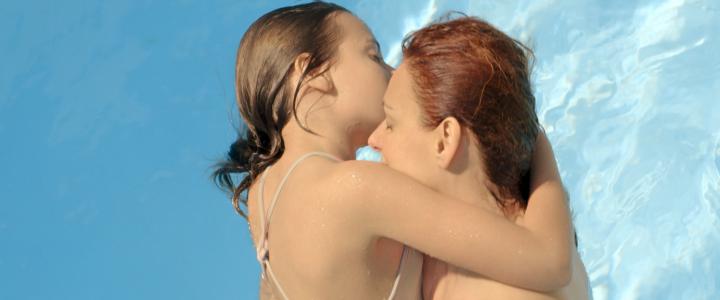Monday | 21. July. 2014
PULA CONVERSATIONS: Nina Violić
Nina Violić, director, screenwriter, costume designer, art designer and actress in the short-length film Separation
Why is the film set in a swimming pool?
A swimming pool seemed like an ideal location because it is a public space in which a child can disappear. A perfect trip for a mother and a daughter where the mother dreams about relaxation and the daughter about having fun. For me the most important element was water in the last frame as a central place of separation and unification of the daughter and the mother, or the mother and the daughter, as you wish.
Separation is an intriguing mixture of the documentary and the narrative, that what is acted, the fictional.
I always tackle the relationship between the documentary and the narrative, be it in theatre or in film. For a century and a half, this principle has been legitimate in theatre and nowadays nobody even cares what belongs to what genre. When it comes to film, rules are much stricter.
For me, everything I author always involves rethinking of an obsession of mine. I always tackle intimate problems, never searching for a perfect story or an ideal screenplay. That is how I choose how to work and who with. The borderline between the documentary and the fictional is very loose with me.
Separation is a film about the relationship between a mother and a daughter and I made it with my daughter Roza. However, that is in fact a feature film because it was made the way feature films are made. Of course, Roza didn’t have to act but I would push her into the frame with an idea for her to play or swim in a certain direction. What to call it then: a documentary or a feature film? I have no idea. In the future, I would like to use the elements of both, to explore the relationship between the documentary and the fictional much more. I love authors who do that. I’m always interested in them in a special way.
The selection of Damir Čučić to serve as editor suggests a tendency towards breakthrough, a detachment from the ordinary.
Čučić is such an author. Brave, innovative, true to himself. There are no specific reasons, apart from me wanting to collaborate with him. In the future, I would like to surround myself with people like him, for whom film is a challenge and always a new unknown.
I brought Čučić a complete mish-mash of material to Samobor. I didn’t have a screenplay for Separation. I shot it intuitively and this is something that is not likely to repeat itself. And neither is my producer Zdenka Gold going to allow me to do that again.
I learned a lot from Čučić. He made me make decisions, he made me renounce my materials. I learned to love editing in his basement in Samobor. That was the first time I did something like that and I didn’t know whether I would like it, I had no idea whether I would die of boredom or I would think of editing as a creative part of the filmmaking process. It turned out that I liked sitting and cutting.
The first experience of an experienced actress in the role of a film director in terms of expectations?
Separation is the first step in finding my own way or the way to shoot films. I thought I could do many things myself and the thing I learned most is that I need collaborators. Brilliant and talented collaborators. It would have been much easier if I had had an assistant and a schedulist and a costume designer and a prop manager. Even on such a small-scale film, one shouldn’t take risks or work without people because people are solid gold when chaos ensues. All of the frames for the race scene were shot in the same rhythm so we had to knock ourselves out during editing to make the scene longer. And I still think it’s too short. I would shout ‘Stop’ too soon. Most of the frames could have been longer. This might sound funny because Separation is a short film with rather long frames but I realized during the editing process that I would extend some of them even more. Although Čučić doesn’t agree.
As far as my expectations are concerned, I am very pleased because in the end I got the film that I wanted to make. It is not how I imagined it to be at first. I made a different film in terms of narration but what I wanted to say is there now. I asked the question of the separation of a child from a mother in my own way and I have no dilemmas whether that’s it or not. For me, it is.
Where did you shoot the film? When? How long?
Since my DOP Tamara Cesarec and I decided not to use lightning, the Health Resort Istarske Toplice proved to be a perfect choice. Above the inner pool there is a huge glass cupola letting through light that we though was beautiful. That was a problem for Zdenka Gold because that specific light was present only during one short part of the day, when it was sunny. So we shot for two days in October 2012 and then we went back in 2013, in May, when Istria was sunny again, to finish the film. It was finished by cinematographer Eva Kraljević.
Short film as a form?
Short film is a flash. For me it is an interesting form only if it is tackling one question, one sentence, one feeling. That’s why I did it this way. I would never get involved with a full-length film the same way. In fact, that would be a suicide. Full-length films are completely different. I think people make a big mistake when they make short films due to the lack of money and they wanted to make a feature-length film and so they cut the screenplay. Short films cannot tackle serious character development and there is no time to develop a story – they are a moment and that’s how they should be made and perceived.
At what stage is your feature-length film?
My full-length film is awaiting the call for submissions in fall. The seventh revision of the screenplay has been completed. We developed the film through EAVE and now we are waiting. ‘The Reversed Perspective’ or ‘Family Dust’ is a film about how we are not capable of perceiving the world around us in an objective fashion. I confronted three subjective perceptions of the same event – the last half an hour before the disintegration of a family. The film comprises three parts: hers, his and child’s perspective of the last half an hour. Hers and his are narrative whereas child’s perspective is mostly animated.
Janko Heidl



